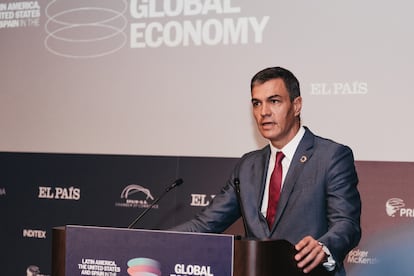At the ‘Latin America, United States and Spain in the Global Economy’ forum, Pedro Sánchez outlines the Spanish government’s priorities
Spain’s acting PM laid out his political project, emphasizing the environmental transition and reducing structural unemployment, at an EL PAÍS event in New York


Spain’s Pedro Sánchez traveled to New York for the UN summit as his rival Alberto Núñez Feijóo seeks to unseat him. The acting prime minister, who seems convinced that he will succeed in his own investiture vote when Núñez Feijóo’s vote fails, has already begun to present an outline of his political project going forward. This Wednesday, at the opening of the Latin America, United States and Spain in the Global Economy forum, Sánchez laid out his government’s future priorities, if he wins the vote of confidence in Congress. His plans consist of reinforcing what his government done over the last four years, with special emphasis on deepening the ecological and digital transition and fighting structural unemployment, a Spanish scourge that the politician is committed to reducing by half. Sánchez, who belongs to Spain’s Socialist Party (PSOE), explained that, although there are many political sectors — especially on the right and far right —who are talking about slowing down the ecological transition amid global economic difficulties, he believes that Spain must speed up and strengthen its position as a leader in renewable energy.
Political, economic and educational leaders from both sides of the Atlantic met on Wednesday morning for the Latin America, the United States and Spain in the Global Economy forum, held at the Roxy Hotel in New York. EL PAÍS and the Spain-U.S. Chamber of Commerce organized the event, sponsored by Abertis, Baker McKenzie, Grupo Nutresa, Iberia, Inditex, and Indra. The Organization of Ibero-American States for Education, Science, and Culture (OEI) participated in the forum as well. The gathering came as the General Assembly of the United Nations (UN) meets in the city this week.
Sánchez and EL PAÍS editor-in-chief Pepa Bueno kicked off the event. Bueno pointed out that the media have the obligation to dwell on debates such as the fight against climate change. Doing so, she argued, makes all citizens feel involved “in the challenges of green transformation and gender equality.” The editor went on to observe that “these are the two great transformations that affect all aspects of our lives,” she concluded.

Sánchez took advantage of the opportunity offered by the largely business-focused forum, to explain the main elements of his economic policy, supplemented by clear data on the huge investments he has planned for the coming years, if he remains in power. Likewise, he expressed confidence that Spain can establish itself as a model of modernity, advanced public policy and commitment to innovation, green economy and multilateralism, as he has at all international forums, despite the fact that some sectors have questioned the feasibility of that.
“We have a clear roadmap that needs to be consolidated in the coming years,” Sánchez explained. “Spain leads growth in the EU. Along with Belgium, we have the lowest inflation in the eurozone at 2.4%. We are going to grow at over twice the EU average this year. And we are going to maintain it in 2024. The labor market grew at a rate of 3% in August, especially in high value-added sectors. Spain’s labor reform has reduced temporary employment by half, to 15%, the European average. Structural unemployment will fall by half a million people by 2025. Exports grew by 24% in 2022. In the context of enormous difficulties, Spain is weathering the inflationary crisis better than other countries. Furthermore, now we know that, according to the Spanish Statistical Office (INE), Spain’s GDP was €20 billion [$21 billion] higher than we previously thought. The opposition claimed that we were not recovering the pre-pandemic GDP, and now we know that we did it in 2022!” Sánchez said.
Reducing unemployment by half
The acting PM laid out three priorities for his government in the future. First, “maintaining momentum for the country’s growth and modernization, not using economic problems as an excuse, progressing in the digital and ecological transformation, with another €94 billion [$100 billion] in investments to supplement the Spanish transformation plan. We are going to move forward on health, cybersecurity, defense, decarbonization, microchips.”
The second major element of his political project for the next four years is tackling unemployment. “We have to break the floor of 8% structural unemployment in our country. It is unacceptable. We are in a position to reduce it by half through the labor reform and put ourselves at European levels. We will continue to modernize our vocational training. We must also change the formulas for organizing work. The debate over the use of time is critical. We must achieve a cultural change in how work is organized, with more flexible working hours to have better work-life balance,” he argued.

The third priority is the environmental transition. “There is no excuse. We have increasingly warmer temperatures; the ecological transition cannot be slowed down. It must go faster. We are going to increase the ambitiousness of Spain’s climate goals. We’re aiming to eliminate half of the emissions by 2030. Renewable energies are our oil. We are going to invest €300 billion [$320 billion] through 2030, we hope to create 500,000 jobs a year, and achieve savings of €90 billion [$96 billion] a year by importing fuels,” Sánchez said. Furthermore, the president argues that all this can be done while keeping public [finances] out of control. “Sometimes it seems that public finances can only remain sustainable through conservative policies. That is not true. We can promote growth, have [progressive] social policies and reduce the public deficit. In Spain, we are going to meet the 3% target in 2024, and we will reduce debt to 109% of GDP. That’s why Spain inspires confidence because we have made gains,” Sánchez said.
Sign up for our weekly newsletter to get more English-language news coverage from EL PAÍS USA Edition
Tu suscripción se está usando en otro dispositivo
¿Quieres añadir otro usuario a tu suscripción?
Si continúas leyendo en este dispositivo, no se podrá leer en el otro.
FlechaTu suscripción se está usando en otro dispositivo y solo puedes acceder a EL PAÍS desde un dispositivo a la vez.
Si quieres compartir tu cuenta, cambia tu suscripción a la modalidad Premium, así podrás añadir otro usuario. Cada uno accederá con su propia cuenta de email, lo que os permitirá personalizar vuestra experiencia en EL PAÍS.
¿Tienes una suscripción de empresa? Accede aquí para contratar más cuentas.
En el caso de no saber quién está usando tu cuenta, te recomendamos cambiar tu contraseña aquí.
Si decides continuar compartiendo tu cuenta, este mensaje se mostrará en tu dispositivo y en el de la otra persona que está usando tu cuenta de forma indefinida, afectando a tu experiencia de lectura. Puedes consultar aquí los términos y condiciones de la suscripción digital.








































